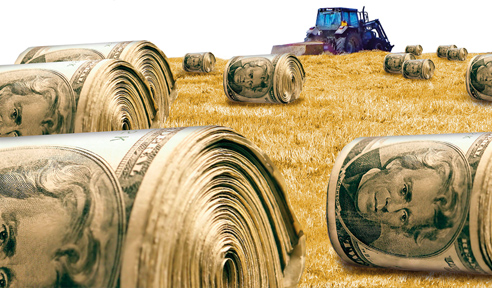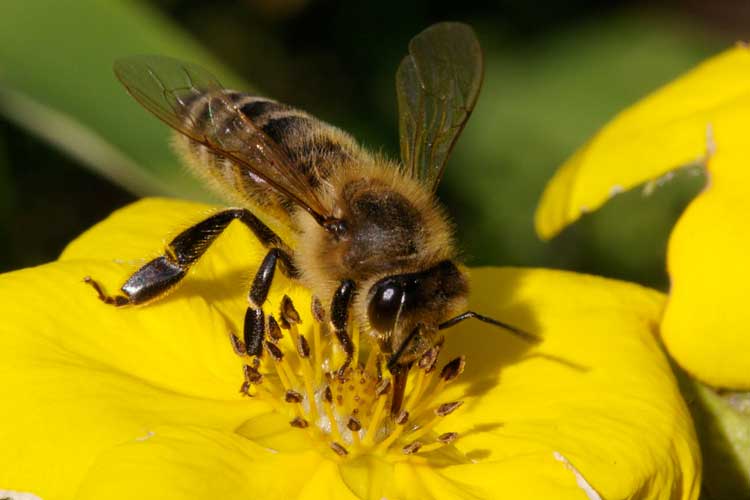The Blogging Farmer
Alex Tiller’s Blog on Agriculture and Farming
Agricultural Subsidies: Time To Start Phasing Out Historically Harmful Policies
The situation of the agricultural sector in the United States has not been relieved by the government. In fact, government policies have made the problem worse. Subsidies have led farmers to overproduce, without a system to manage the excess crops that are grown. Prices fall, and farmers are left with no choice but to demand more funding--they can't afford to run their operations based on crop sales alone. The subsidies themselves put a strain on taxpayers; a ripple effect on the overall economy results. In addition, subsidies produce pernicious effects in farmer behavior; there exists a long historical cycle of Congressional support of subsidies to farmers in this country, and plans for future reform are unnerving to the farmers who rely on them. Only a plan to phase out government payments in a staged approach will assure the well being of our existing farmers, while protecting U.S. farm markets from those countries that subsidize their agricultural sectors.
Problems with government agricultural policies have been endemic since the early 1930s. Farmers were encouraged to stimulate production and, at the same time, advised to restrict it due to low market demand. U.S. subsidies to agriculture go even farther back, however. The Morrill Act of 1862 was one of the first such programs, and was followed by a barrage of programs such as the Hatch Act of 1887, the Federal Farm Loan Act in 1916, the Agricultural Adjustment Act of 1933, the 1996 Freedom to Farm law, and more recently, the much-contested subsidy laws in 2002 and 2008.
Perhaps the most controversial type of subsidy is direct payment to farmers. The amount of money received is calculated by historical figures and not current production. Even if the land isn't even used for farming anymore, the Department of Agriculture still makes the payment. A report by The Washington Post in 2006 said the department spent over $1 billion in direct payments for non-farmers. Clearly there needs to be reform to some degree here; you don't even have to agree that the government shouldn't subsidize farms, to agree that the government shouldn't spend farm subsidy money on non-farmers.
The days of subsidy may be numbered. President Barack Obama has introduced a deficit-reduction plan that includes a proposal to slash $2.5 billion in direct payments to agricultural businesses over the next 10 years. The cap on payments was reduced 25% and the income eligibility of farmers reduced. Still, just two percent of farmers would be affected by the tighter guidelines. In a report by the Center for American Progress, experts in the field say that phasing out the automatic direct payments, adding up to nearly $5 billion every year, can be applied to reducing the deficit. The savings could then be reinvested in programs that encourage the use of renewable energy and energy efficient technologies.
The CAP report further suggests that agricultural exports should be boosted using money that is saved, while promoting small business at the same time. A burden on farmers that has existed for so long could be lifted with a carefully orchestrated plan to phase out subsidies. The government could also benefit. An estimated $35 billion could be saved by 2020, most of which could contribute to reducing the deficit. Billions of dollars are also spent on other forms of subsidies, and phasing out direct payments is just one step on the ladder, but at least a step in the right direction. With so many farmers in economic crisis in 2011, it is important that the changes occur in stages in order for them to adjust.
(Posted August 17, 2011 at Alex Tiller’s Blog on Agriculture and Farming)
Sources:
In Motion Magazine
CATO Institute
Center for American Progress***
Busy as Bees: How Beekeeping Programs Are Reshaping Hawaiian Agriculture
The fragility of the Earth's ecosystems is appreciated most in ecologically rich places such as Hawaii. Natural wonders stretch across majestic views and are an inspiration to many, but the small things are what make the environment conducive for human survival. Honeybees are often misunderstood creatures; most people that see them just want to avoid the insects so they don't get stung. But bees are the highway to pollination for many plant and flower species, contributing to their survival, not to mention the beauty and allure of the Hawaiian Islands. Bee hives are natural factories for honey, a delicacy which humans consume worldwide and seem to have an insatiable appetite for. Beekeeping is both a potential career and a source of economic growth for Hawaii's struggling agricultural environment.
An example of how lucrative beekeeping can be was recently provided by Dr. Lorna Tsutsumi, who teaches a beekeeping class at the university. Beekeeping, in fact a thriving business on the islands, is taught as a course at the University of Hawaii--Hilo (UH Hilo). When students reported on and photographed a bee colony, they realized that after nine months that 13 bee colonies had expanded from what was originally one. Thus began the Adopt-a-Beehive with Alan Wong project.
Inconspicuous dangers lurk for bees, such as mites and other pests. Bee colonies can easily die out if their environment is threatened or invaders such as Little Fire Ants enter their hives. The Adopt-a-Beehive project has become a success story, and the students participating in the program even got to taste their own honey. This very same honey is being added to the menu of Alan Wong's restaurants in Hawaii, anchored by the formal establishment of the Adopt-a-Beehive with Alan Wong program through UH Hilo and the University of Hawaii Foundation.
Hawaiian honey bee keepers inspecting a brood chamberThe university's College of Agriculture, Forestry, and Natural Resource Management offers two courses in beekeeping. A farm owned by the school is accessible to students who seek a Bachelor's degree in Agriculture. By joining chef Alan Wong's program, participants can help support research and development of better beehive practices. They also have the chance to educate the public about how Hawaii needs to sustain its own food production instead of relying on imports. The high prices of imports have raised the costs of living in the state to unacceptably high levels.
Potential donors have called the university in support of Dr. Tsutsumi's beekeeping efforts. For culinary-conscious honey enthusiasts, Alan Wong will be hosting an upcoming Farmer Series Dinner during which honey from the chef's own adopted beehive will be served. Human consumption doesn't always have to raise environmental concerns; sometimes it is aided by conservation efforts and a desire to preserve nature's wonders. Dr. Tsutsumi and Alan Wong's Adopt-a-Beehive program has addressed both, while raising awareness of educational and agricultural business opportunities in a place where high-priced imports continue to plague the local economy.
Could you do something similar with your farm and a local restaurant in your community?
(Posted on July 25, 2011 at Alex Tiller’s Blog on Agriculture and Farming)
Sources:
Alan Wong's Restaurants
University of Hawaii--Hilo
Adopt-a-Beehive with Alan WongFurther reading:
“A History of Honey Bees in the Hawaiian Islands” by Kevin M. Roddy and Lorna Arita-Tsutsumi, University of Hawai’I at Hilo
Hello, and thanks for checking out my blog. My name is Alex Tiller and I grew up in rural Ohio (Clark County) where my family still owns farmland (corn and beans). I am a member of the American Society of Farm Managers and Rural Appraisers and am also an agribusiness author/blogger. I write about commercial farming, family farms, organic food production, sustainable agriculture, the local food movement, alternative renewable energy, hydroponics, agribusiness, farm entrepreneurship, and farm economics and farm policy. I visit lots of farms in different areas of the country (sometimes the world) that grow all kinds of different crops and share what I learn with you through this blog.? You can contact me via email by clicking here: Email Alex
Founder/Publisher/Editor: David McGee
Contributing Editors: Billy Altman, Laura Fissinger, Christopher Hill, Derk Richardson
Logo Design: John Mendelsohn (www.johnmendelsohn.com)
Website Design: Kieran McGee (www.kieranmcgee.com)
Staff Photographers: Audrey Harrod (Louisville, KY; www.flickr.com/audreyharrod), Alicia Zappier (New York)
E-mail: thebluegrassspecial@gmail.com
Mailing Address: David McGee, 201 W. 85 St.—5B, New York, NY 10024





